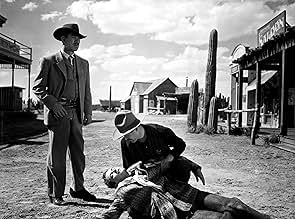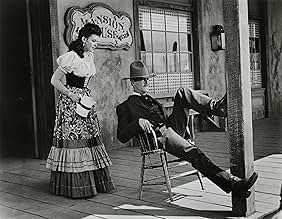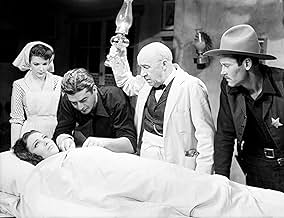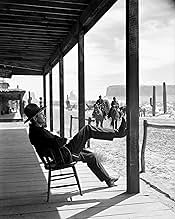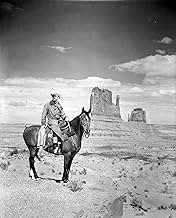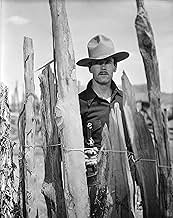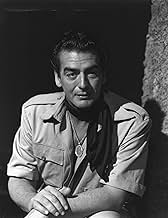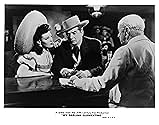IMDb-BEWERTUNG
7,7/10
26.675
IHRE BEWERTUNG
Die Earps kämpfen im OK Corral in Tombstone, Arizona, gegen die Clantons.Die Earps kämpfen im OK Corral in Tombstone, Arizona, gegen die Clantons.Die Earps kämpfen im OK Corral in Tombstone, Arizona, gegen die Clantons.
- Auszeichnungen
- 3 wins total
Robert Adler
- Stagecoach Driver
- (Nicht genannt)
C.E. Anderson
- Townsman
- (Nicht genannt)
Don Barclay
- Opera House Owner
- (Nicht genannt)
Hank Bell
- Opera House Patron
- (Nicht genannt)
Handlung
WUSSTEST DU SCHON:
- WissenswertesThe cantankerous Walter Brennan disliked John Ford so much that he never worked with him again. One time when Brennan was having trouble getting into the saddle, Ford yelled, "Can't you even mount a horse?" Brennan shot back, "No, but I got three Oscars for acting!"
- PatzerThe movie shows James Earp killed (murdered) with his marker showing "born 1864 died 1882". However, James Earp was in fact born in 1841 and died in 1926 of natural causes. It was Morgan Earp who was murdered on 18 March 1882.
- Zitate
Wyatt Earp: Mac, you ever been in love?
Mac: No, I've been a bartender all me life.
- Alternative VersionenIn 1994, an alternate "preview" version of the film was found that runs 103 or 104 minutes, according to different sources. In June 1946, director John Ford showed producer Darryl F. Zanuck his cut of the film. Zanuck's opinion was that the film had some problems, so Zanuck reshot certain scenes with Director Lloyd Bacon. Zanuck also recut other scenes, changed the music at certain points, and slightly altered the finale. In all, 35 minutes of footage was shot or recut, and the film was released at 97 minutes. Both the 103-104 min. archival preview print and the 97 min. release print are on the Fox DVD released January 6, 2004.
- VerbindungenEdited into John Ford - Der Mann, der Amerika erfand (2019)
- Soundtracks(Oh My Darlin') Clementine
(1884) (uncredited)
Music by Percy Montrose
Lyrics by H.S. Thompson
Played and Sung during the opening credits and at the end
Also Whistled by Henry Fonda entering the hotel lobby on Sunday morning; stops whistling when he sees Clementine
Ausgewählte Rezension
If you're looking for a straight-forward, fairly factual presentation of the events leading up to the 'Gunfight at the O.K. Corral', watch 'Wyatt Earp', or 'Tombstone'...But if you prefer your history more spiritual, and want to see a master storyteller paint a visual canvas of a West that may never have existed, but SHOULD have, then this film should be a treasured part of your video collection!
John Ford knew Wyatt Earp personally, and was familiar with the events surrounding the Tombstone shootout, but one of his greatest assets as a director was his ability to look beyond simple facts, and focus on what 'made' a legend. 'My Darling Clementine' is a story of icons, of Loners, accepting their own weaknesses and limitations, yet willing to risk their lives and abilities to aid others, then to walk away, allowing Civilization to grow. It's a classic theme of most great westerns, particularly in Ford's work (he would return to it in 'The Searchers', and 'The Man Who Shot Liberty Valance'), as well as other directors ('Shane', 'A Fistful of Dollars', 'Unforgiven', and 'Open Range' are a few examples).
Wyatt Earp (wonderfully portrayed by Henry Fonda) and his brothers have an aloofness that makes their characters both deceptively simple, yet enigmatic at the same time. At the film's start, Wyatt's a cowpuncher who had walked away from the responsibilities of being a lawman, finding satisfaction with his brothers in the hard work and solitary life of the range. When the Clantons (led by Walter Brennan, in one of his greatest, yet most vicious roles), first approach the brothers on the range, they accept the old man's invitation to get a taste of city life, but it's clear that it will only be a brief stay before they move on, and Wyatt brushes aside any overtures of friendship.
Wyatt's lack of desire to commit to a larger community is stressed when he subdues an armed, drunken Indian with his bare hands in a saloon (based on an actual event in Earp's life), then turns down the city council's plea to accept the Marshall's badge. Only after a brother is murdered do the Earp brothers decide to clean up the town, as it had become 'personal'.
In counterpoint to Earp is another 'loner', Doc Holliday (sensitively portrayed by Victor Mature), an intellectual who fled the South, and had found his solitude through his guns, his gambling, and his illness. While Wyatt is a true 'Man of the West', however, Holliday is simply a lonely man with no place to go, only comfortable at a poker table. He is doomed, more by his own shrinking world, than by the disease that forces him to cough into his handkerchief.
The scenes of Wyatt in Tombstone are wonderful, as Civilization grows up around the uncomfortable stranger. Yet he toys with the idea of settling into this world, through his polite yet obvious attraction to Doc's lost love, Clementine. The scene of the outdoor church dance, where the stiffly formal Earp dances against the vista of a West being 'boarded in' is symbolic of what his own life, and the West, itself, was becoming, and is classic Ford!
The climactic shootout at the O.K. Corral is both powerful and raw, ultimately fulfilling the Earps' commitment to a world that needed their aid, and ending the downward spiral of Holliday's life, in a heroic and theatrical gesture.
It's often asked why Wyatt leaves, afterward, when Clementine and Tombstone are so attractive...The answer is simple, really; his work is finished, and his participation was no longer necessary. Civilization could now grow, unimpeded. The Loner would have no place there. Like Ethan, or Shane, or 'The Man With No Name', he must return to the solitary vistas that are his true home.
John Ford has truly created the 'Stuff of Legends' with this beloved classic!
John Ford knew Wyatt Earp personally, and was familiar with the events surrounding the Tombstone shootout, but one of his greatest assets as a director was his ability to look beyond simple facts, and focus on what 'made' a legend. 'My Darling Clementine' is a story of icons, of Loners, accepting their own weaknesses and limitations, yet willing to risk their lives and abilities to aid others, then to walk away, allowing Civilization to grow. It's a classic theme of most great westerns, particularly in Ford's work (he would return to it in 'The Searchers', and 'The Man Who Shot Liberty Valance'), as well as other directors ('Shane', 'A Fistful of Dollars', 'Unforgiven', and 'Open Range' are a few examples).
Wyatt Earp (wonderfully portrayed by Henry Fonda) and his brothers have an aloofness that makes their characters both deceptively simple, yet enigmatic at the same time. At the film's start, Wyatt's a cowpuncher who had walked away from the responsibilities of being a lawman, finding satisfaction with his brothers in the hard work and solitary life of the range. When the Clantons (led by Walter Brennan, in one of his greatest, yet most vicious roles), first approach the brothers on the range, they accept the old man's invitation to get a taste of city life, but it's clear that it will only be a brief stay before they move on, and Wyatt brushes aside any overtures of friendship.
Wyatt's lack of desire to commit to a larger community is stressed when he subdues an armed, drunken Indian with his bare hands in a saloon (based on an actual event in Earp's life), then turns down the city council's plea to accept the Marshall's badge. Only after a brother is murdered do the Earp brothers decide to clean up the town, as it had become 'personal'.
In counterpoint to Earp is another 'loner', Doc Holliday (sensitively portrayed by Victor Mature), an intellectual who fled the South, and had found his solitude through his guns, his gambling, and his illness. While Wyatt is a true 'Man of the West', however, Holliday is simply a lonely man with no place to go, only comfortable at a poker table. He is doomed, more by his own shrinking world, than by the disease that forces him to cough into his handkerchief.
The scenes of Wyatt in Tombstone are wonderful, as Civilization grows up around the uncomfortable stranger. Yet he toys with the idea of settling into this world, through his polite yet obvious attraction to Doc's lost love, Clementine. The scene of the outdoor church dance, where the stiffly formal Earp dances against the vista of a West being 'boarded in' is symbolic of what his own life, and the West, itself, was becoming, and is classic Ford!
The climactic shootout at the O.K. Corral is both powerful and raw, ultimately fulfilling the Earps' commitment to a world that needed their aid, and ending the downward spiral of Holliday's life, in a heroic and theatrical gesture.
It's often asked why Wyatt leaves, afterward, when Clementine and Tombstone are so attractive...The answer is simple, really; his work is finished, and his participation was no longer necessary. Civilization could now grow, unimpeded. The Loner would have no place there. Like Ethan, or Shane, or 'The Man With No Name', he must return to the solitary vistas that are his true home.
John Ford has truly created the 'Stuff of Legends' with this beloved classic!
Top-Auswahl
Melde dich zum Bewerten an und greife auf die Watchlist für personalisierte Empfehlungen zu.
- How long is My Darling Clementine?Powered by Alexa
Details
Box Office
- Budget
- 2.000.000 $ (geschätzt)
- Weltweiter Bruttoertrag
- 15.293 $
- Laufzeit1 Stunde 32 Minuten
- Farbe
- Seitenverhältnis
- 1.37 : 1
Zu dieser Seite beitragen
Bearbeitung vorschlagen oder fehlenden Inhalt hinzufügen

Oberste Lücke
By what name was Faustrecht der Prärie (1946) officially released in India in Hindi?
Antwort

